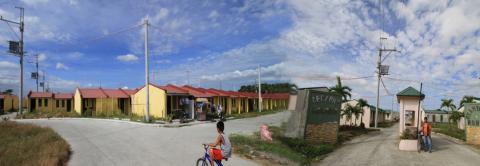
Reelectionist Senator Sonny Angara said the country’s housing backlog could balloon up to 12 million by 2030 if left unaddressed and the homeless population could reach crisis proportions unless the government steps up efforts to provide them with permanent shelter.
“Out of a population of roughly 106 to 108 million Filipinos, some 4.5 million don’t have any shelter and up to two-thirds of that number—3 million—are here in Metro Manila,” Angara said during an event organized by the Chamber of Real Estate & Builders’ Associations Inc. (CREBA) in Makati City.
Unless action is taken, Angara said citing a 2016 study by the University of Asia and the Pacific, the government housing backlog could reach 12 million in the next decade, including the backlog of over 6 million units from 2001 to 2015.
Ironically, Angara said these alarming figures came out in the midst of a booming real estate industry, which from 2014 and 2018 contributed up to 12 percent of the country’s gross domestic product (GDP) and taken up more than 18 percent of total bank loans.
He noted that while the market had a surplus of up to 561,000 units in mid- and high-cost housing in 2015, the gap for socialized, economic, low and even free housing was more than 11 times than that number, which is around 6.67 million units.
“In short, our real estate industry may be booming, but we’re doing poorly when it comes to sheltering our people and providing them with homes,” lamented the lawmaker from Aurora, who is running under the platform “Alagang Angara.”
Housing, he said, plays a central, crucial role in the lives of poor Filipinos, as he noted that poverty eradication was unlikely to be met without addressing basic housing needs.
“Such housing crisis is just one piece of the greater puzzle that plagues our country—that of chronic poverty,” Angara said.
He added: “And although it is but one aspect of the problem, it is nevertheless critical. Because without a home, one cannot plant their roots. One cannot lay down the stable foundation on which everything else in their lives should be built.”
Thus, Angara called for a paradigm shift in housing policy and practice amid the growing urgency to provide adequate, safe and affordable housing to millions of Filipino households.
The reelectionist senator also urged the government to spend more for housing to ensure that all Filipinos have access to decent homes.
Data from the Asian Development Bank showed that between 2000 and 2014, the Philippines spent only 0.12 percent of GDP for housing, in stark contrast to the average 0.75 of GDP spent by Indonesia, Malaysia, Singapore, Thailand, Bangladesh, Mongolia, Nepal and Sri Lanka for the sector.
For his part, Angara had fought for the retention of the VAT exemption for socialized and low-cost housing while Congress was deliberating on the government’s tax reform program.
This means that socialized housing units that cost P450,000 and below and low-cost housing units priced at P1.7 million and P3 million remain VAT-free. Various studies showed that lifting the exemption would only drag down all efforts at solving the housing backlog.
Angara was also an author and co-sponsor of the newly enacted law creating the Department of Human Settlements and Urban Development (DHSUD).
The department focused on housing and human settlement issues was finally realized after languishing in the legislative mill for 27 years, spanning 9 Congresses.
Angara said the work towards addressing the housing problem has just begun with the creation of DHSUD.
“Given the gravity of the problems we face, I don’t think we should wait another three decades before we enact even more major reforms to our housing policies and programs,” he said. #
